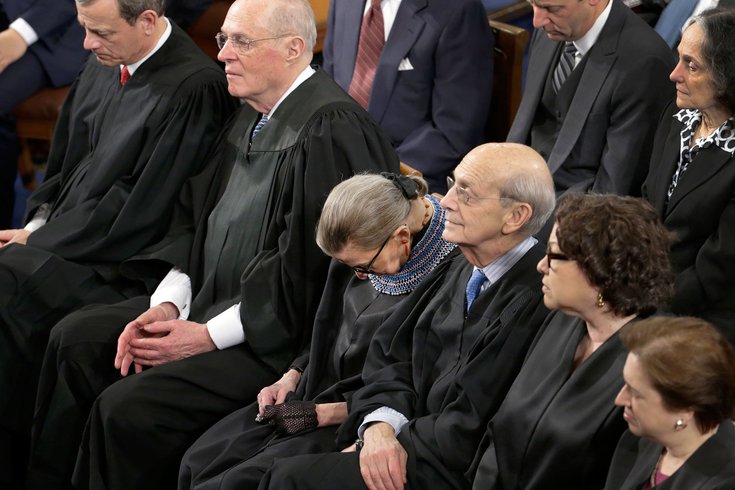
June 22, 2015
 Pablo Martinez Monsivais/AP
Pablo Martinez Monsivais/AP
n this photo taken Jan. 20, 2015 members of the Supreme Court, including Justice Ruth Bader Ginsburg, center, rests during President Barack Obama's State of the Union address on Capitol Hill in Washington.
The U.S. Supreme Court ruled on Monday against the inventor of a Spider-Man toy by quoting a famous line associated with the comic book superhero about how with great power comes great responsibility.
Justice Elena Kagan cited the line in explaining why the court, in a 6-3 ruling, had declined to overrule a legal precedent more than a half century old concerning patent royalties.
The court decided in favor of Walt Disney Co's Marvel Entertainment LLC in its legal fight with Stephen Kimble and an associate, Robert Grabb, over royalties on a web-shooting toy called the Spider-Man Web Blaster.
The court can overturn its own precedents, Kagan said.
"What we can decide, we can undecide," Kagan wrote, but added "we should exercise that authority sparingly."
Kagan then offered the oft-quoted cautionary line from Spider-Man lore in which the superhero is counseled that "in this world, with great power there must also come - great responsibility."
Kimble had asked the court to overrule the precedent, which said royalty payments generally do not need to be made after a patent has expired as is the case with the Spider-Man Web Blaster. Marvel, which has paid Kimble more than $6 million over the years to use the patent in the toy, had argued that the precedent set in a 1964 Supreme Court ruling should stand.
Justice Samuel Alito wrote a dissenting opinion noting that the 1964 decision should be overturned because it was "not based on anything that can plausibly be regarded as an interpretation of the Patent Act."
The ruling was "based instead on an economic theory - and one that has been debunked," Alito added.
Fellow conservative justices John Roberts and Clarence Thomas were the other dissenters.
Kimble obtained a patent for his web-shooting glove in 1991, later assigning it to Marvel in return for a royalty fee.
After Kimble in 2008 claimed breach of contract, Marvel argued that the 1964 Supreme Court ruling in the case Brulotte v. Thys Co involving a harvesting machine meant it would not be required to pay the royalties once the patent expired in 2010.
A federal judge in Arizona agreed, and in 2013, the San Francisco-based 9th U.S. Circuit Court of Appeals upheld the decision, saying it was bound by the Supreme Court precedent.
The case is Kimble v. Marvel, U.S. Supreme Court, No. 13-720.
(Reporting by Lawrence Hurley; Editing by Will Dunham)